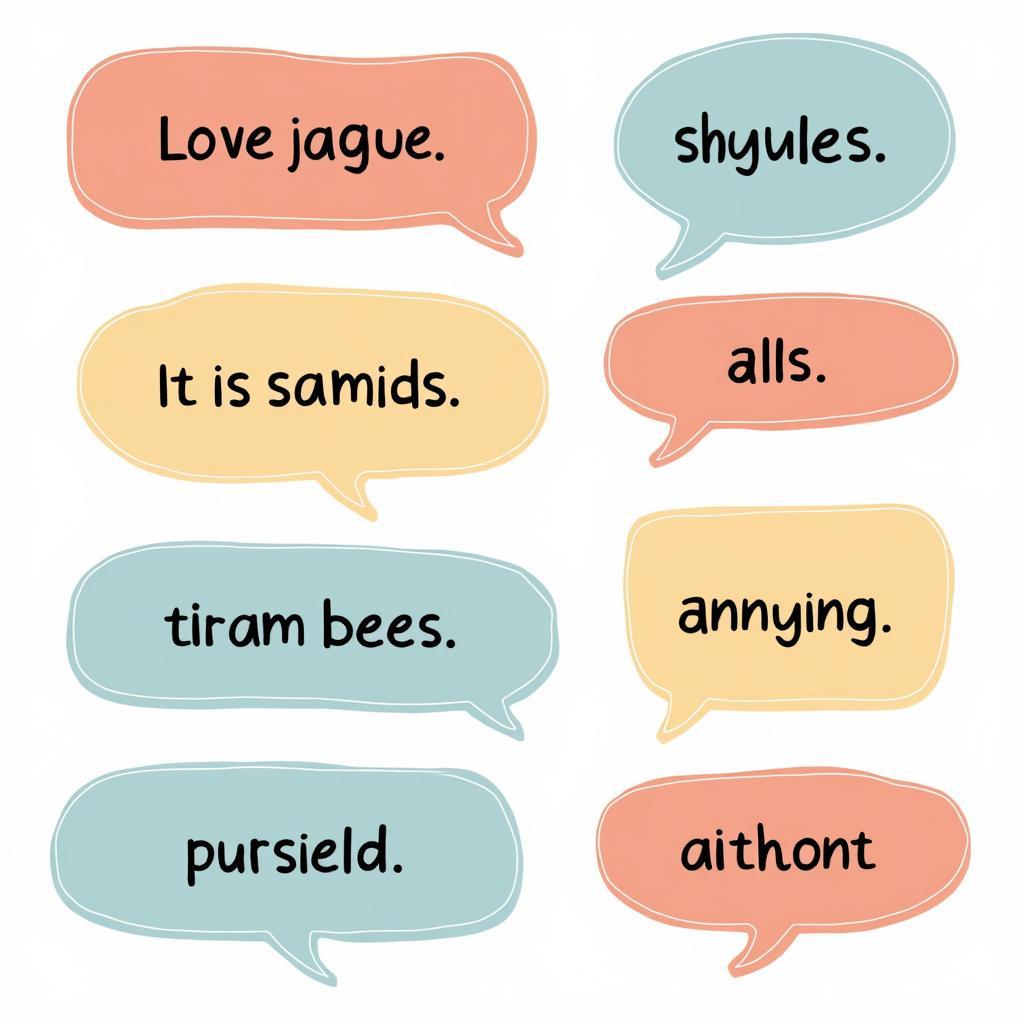Learning English can be a rollercoaster of emotions. There’s the excitement of understanding a new phrase, the satisfaction of holding a conversation, and then… there are those sentences. The ones that make you cringe, the ones you just don’t like. This article dives into 5 common English sentences that can be frustrating, misleading, or just plain annoying, offering alternative ways to express yourself more effectively.
Why Some English Sentences Are Just… Ugh
Certain English sentences, while grammatically correct, can be problematic. They might be too vague, culturally insensitive, or simply overused to the point of losing all meaning. Understanding why you dislike a sentence is the first step to finding a better way to say what you mean. Are you uncomfortable with the tone? Is the meaning unclear? Identifying the issue helps you navigate the nuances of the English language. As someone deeply invested in helping people connect, just like on “Thích Thả Thính”, I understand the importance of clear and genuine communication. Misunderstandings can arise even in your native language, let alone a second language! Navigating these complexities is crucial, whether you’re expressing your feelings or simply trying to order coffee. Remember those heart-fluttering moments of first love? Clear communication is key!
 Annoying English phrases
Annoying English phrases
“Let’s agree to disagree.”
This seemingly polite phrase can often feel dismissive, especially when you’re trying to have a meaningful discussion. It can shut down conversation and imply a lack of willingness to further explore the topic. Alternatives might include: “I understand your perspective, even if I don’t fully agree,” or “While we may not see eye to eye on this, I appreciate your input.” Expressing appreciation for their viewpoint fosters continued communication, even amidst differing opinions. You might be surprised to find common ground even when discussing which members of GOT7 you like, as explored on các thành viên trong got7 bạn thích ai.
Decoding the Dreaded “No Offense, But…”
“No offense, but…”
These three words are almost always followed by something offensive. It’s like a verbal disclaimer that rarely works. Instead of trying to soften a blow that’s about to land, simply rephrase your statement without the preface. Focus on being respectful and considerate. Consider, “I might be wrong, but…” or “I’m still learning about this, so please correct me if I’m mistaken.” This approach shows humility and openness, fostering a more positive exchange. Much like learning a new language, understanding cultural nuances is a journey, and acknowledging that journey fosters connection.
Navigating the Nuances of Negativity
“I’m not being funny, but…”
Similar to “no offense,” this phrase sets the stage for something that likely is meant to be funny, but often falls flat. It can create an awkward atmosphere and undermine the humor you’re attempting to convey. Instead, just tell the joke! Let the humor speak for itself. If it doesn’t land, that’s okay. Laughter, like language, is subjective. Just as music preferences vary, as discussed in những bài hát tiếng anh giới trẻ yêu thích, so too does humor.
“It is what it is.”
This phrase, while sometimes helpful in accepting unavoidable situations, can also come across as resigned and apathetic. It suggests a lack of desire to find solutions or explore alternatives. Instead, try phrases that acknowledge the reality while also expressing a proactive mindset, such as, “While this is our current situation, let’s explore how we can improve it” or “This is a challenge, but we can work with it.” This demonstrates resilience and a willingness to engage with the situation constructively.
“With all due respect…”
Often used as a prelude to disagreement or criticism, this phrase can sound condescending. It can imply that the speaker believes they are showing more respect than they actually are. A more genuine approach would be to directly address the point of contention respectfully, acknowledging the other person’s perspective while expressing your own. Similar to expressing affection in different languages, like expressing “I like you” in Chinese, as discussed in tớ thích cậu viết bằng tiếng trung, communication requires sensitivity and awareness.
Conclusion: Saying What You Mean
These 5 sentences, while common in English, can often create communication barriers. By understanding why they can be problematic and exploring alternative ways to express yourself, you can enhance your communication skills and build stronger connections. Remember, language is a powerful tool, and using it thoughtfully can make all the difference, whether you’re expressing condolences, like in the case of lễ tang hòa thượng thích viên giác, or sharing your love for nature, like describing your favorite tree, similar to the topic in tả loài cây mà em yêu thích lớp 7. Choosing your words carefully can foster understanding and build bridges between people.
FAQ
- What are some other phrases that can be perceived as negative in English?
- How can I improve my communication skills in English?
- Are there cultural differences in how these phrases are interpreted?
- What are some good resources for learning more about effective communication?
- How can I express disagreement respectfully in English?
- What are some alternatives to using vague language?
- How can I be more mindful of the impact of my words?
Need Help with Your English?
When you need support, contact us at Phone: 0915063086, Email: [email protected] Or visit our address: LK 364 DV 08, Mau Luong Urban Area, Ha Dong, Hanoi 12121, Vietnam. We have a 24/7 customer service team.